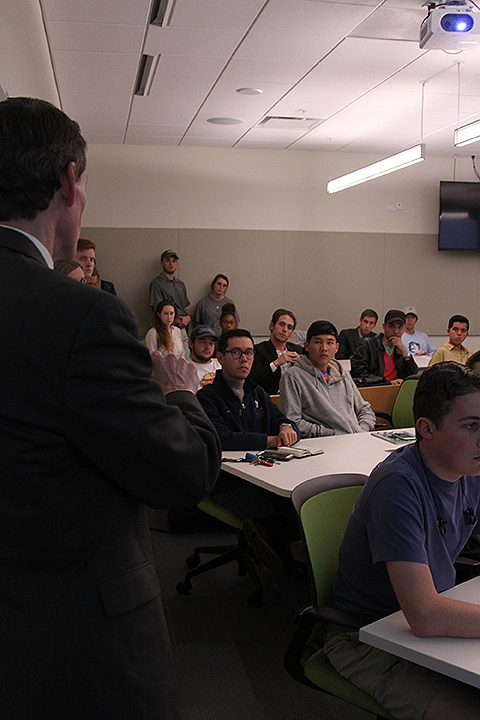By Bailey Brammer | Staff Writer
Student government held an interest meeting for students looking to apply for the position of student regent for the 2017-18 school year on Tuesday evening at the Paul L. Foster Campus for Business and Innovation.
The Baylor Board of Regents has two student regents, Charlotte, N.C., senior Daniel Thomas and Waco senior Emily Neel, both of whom serve as non-voting members of the board and are expected to attend four board meetings each year.
“Being a student regent is an extremely unique position that not all universities have,” Neel said. “For Baylor to offer this to students and to have this communication between students and the board is extraordinary.”
Student regents serve a one-year term and must be full-time undergraduate students at Baylor. They are required to have at least a 2.67 GPA to apply, as well as a committed Christian faith and a signed confidentiality agreement and conflict of interest disclosure. The Board of Regents can select up to two student regents each year.
“You’re a student leader serving Baylor in a lot of different ways,” Thomas said. “People who end up getting selected are people who have a fairly good grasp of where the student body is. You need to be aware … A lot of it is making sure I have an understanding of what’s going on with the students.”
Thomas said that aside from attending quarterly meetings, the time commitment each week averages about eight to 10 hours, which is spent meeting with administrators, serving on various student councils and preparing for meetings, among other tasks. The student regents also work alongside Port Barre, La., senior Lindsey Bacque, student body president, and Dr. Kevin Jackson, vice president for student life.
Neel and Thomas both said that one of the most important aspects of being a student regent is to recognize that the position is not to act as a lobbyist but rather as a bridge between students and the board.
“You’re not coming in with your own agenda,” Neel said. “You don’t have it all figured out, and you need to always be able to take in new information on where you’re at and where you need to go. You’re part of a team.”
Some of the topics the student regents had to deal with this year are diversity, Title IX issues, enrollment management and scholarships.
For Huxley, Iowa, sophomore Austin Allaire, the idea of being able to represent the student body’s perspective on a larger scale was what drew him to apply for the position of student regent.
“I’ve gotten to know some of the students who are currently serving as regents and those who have already served, so I was really interested in the voice that they’ve been able to have as Baylor’s been moving through various seasons and challenges,” Allaire said.
Even though she has been given the opportunity to express the opinions of the student body, Neel believes that it is imperative for future student regents to remember that they are speaking for all students, not just for their own interests.
“You are one of 16,000 students,” Neel said. “You have to have an open mind no matter what school you came from or what other organizations you’re in … You represent more than that. You need to put aside those things that you’re anchored to and think about the 16,000 people you represent.”
Applications can be found on Baylor student government’s website, as well as in the student government office and in Jackson’s office. All applications are due by 5 p.m. Jan. 13 in Jackson’s office, and must include two letters of recommendation, one of which must be from a Baylor faculty member, as well as a copy of the student’s resume and unofficial transcript.



